In central Thailand’s Phichit and Phetchabun provinces, over 6,000 villagers are severely affected by the goldmining operations of Akara Resources Public Company Limited, a Thai subsidiary of the Australian company Kingsgate Consolidated Limited. In 2001, the company started its commercial mining operations at the Chatree Goldmining Complex – just 300 meters from where the communities live. The communities are Thai citizens who have lived in the area for generations. They primarily make a living through farming and are dependent on the area’s natural resources, such as water and land. However, since Akara started its operations, villagers have experienced adverse impacts to their livelihoods and environment. Their fundamental human rights have been violated.
What happened and how are communities’ rights violated?
During the past 20 years, villagers’ rights have been continuously violated as a result of Akara’s mining operations and the Thai government’s inaction.
In 2003, villagers started to experience the first adverse effects. Harm was caused to the environment with natural resources becoming heavily polluted. Air and noise pollution were caused by controlled blasts using explosives, as well as usage of machinery and trucks. Later, villagers noticed that mining operations caused water shortages as they no longer had sufficient water for consumption or farming. Communities suffered even more harm after finding that groundwater had become contaminated with heavy metals, such as cyanide, manganese and arsenic from Akara’s tailing storage facility. The water could no longer be used for consumption, bathing, cooking or farming, severely affecting communities’ lives and livelihoods.
Violation of communities’ right to safe and clean water
The right to safe and clean water is protected in the 2017 Constitution of Thailand, which declares: “The State should take actions relating to land, water resources and energy as follows: to provide quality water resources which are sufficient for consumption by the people, including for agriculture, industry and other activities.”
Despite the recognition of safe water as a constitutional right, the government failed to uphold this right. While in April 2010 the government acknowledged that water resources surrounding the mine were contaminated with heavy metals, it failed to hold Akara accountable – neither compelling the company to provide sufficient clean water to villagers nor providing water to villagers themselves. On the few occasions villagers did receive water, supply was: insufficient, only covered a few of the 6,000 affected community members, in instances not suitable for drinking, and only provided for short periods of time. Without access to a sufficient supply, villagers had to buy water elsewhere, spending approximately 400 Thai Baht ($13) per month. Due to the contamination of their water sources, villagers were unable to continue farming and could no longer consume home-grown crops. Therefore, they had to spend an additional 800 Thai Baht ($28) per month to buy vegetables, and to buy these, they had to travel as far as ten kilometers. Villagers unable to afford water or vegetables were forced to continue consuming contaminated crops and water, posing severe risks to their health. Not having access to safe and clean water sources violates numerous other fundamental human rights.
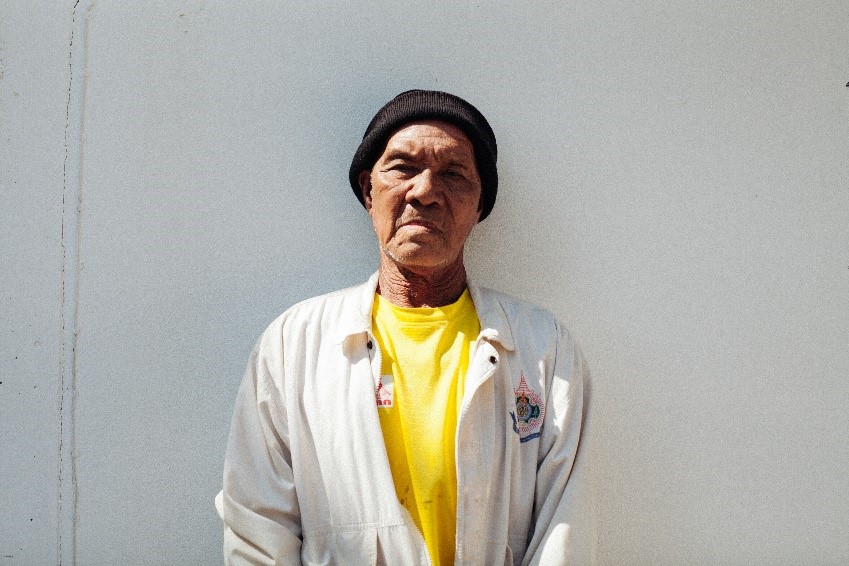
“Before we used to drink water from the shallow pond. But now we cannot and we need to buy water. We do not have much money, and we have to spend 400 Thai Baht per month on water”.
Violation of the communities’ right to the highest standard of attainable health
The impact of Akara’s operations was devastating to the villagers, their environment, and their health. Air and noise pollution led to lack of sleep, skin diseases, blurred vision, ear diseases, and breathing difficulties. Water contamination also led to dry throat, cough, rash, lung and respiratory diseases, numbness, reduced strength, and heightened risk of having blood, skin, and liver cancer. Pregnant women and children are particularly vulnerable to these health issues. Besides the damage to people’s physical health, community members also experienced mental health issues with some suffering from neurosis and depression due to the knowledge of having toxic chemical substances in their bodies. These numerous health issues meant villagers had to visit clinics and hospitals frequently, for which they bore the expense of transport and treatment themselves.
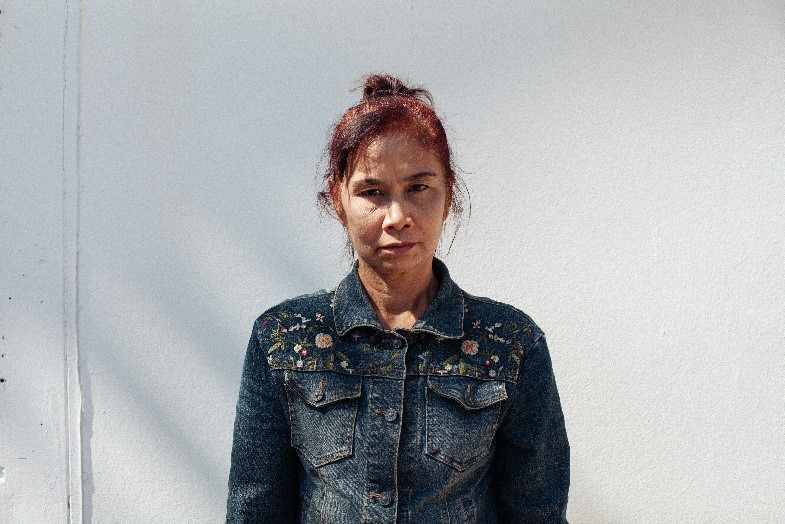
“We had flesh wounds on our skin from scratching, both on our arms and legs. It was very painful”.
Violation of the communities’ right to work
Resulting from the polluted natural resources and the environment, particularly the contaminated groundwater, farmers were no longer able to cultivate their lands and thus lost their main source of income. Consequently, they faced economic instability and were forced to migrate to other areas to seek employment or travel long distances to work every day. In most cases those who found alternative employment worked low paid jobs in construction, agriculture or the informal sector, lacking decent working conditions and protection under labour laws. Those unable to find alternate employment were forced to continue farming the contaminated lands, posing a risk to their own health as well as to the health of the consumers of the crops.
Violation of communities’ right to public resources and highways
Villagers also temporarily lost access to public resources and highways. This is especially problematic given the fact that villagers have to travel outside their area to visit healthcare facilities, and to buy clean water and crops. The people living in Phetchabun province were especially affected as they used a public road blocked by Akara to go to the market and hospital in Phitsanulok province.
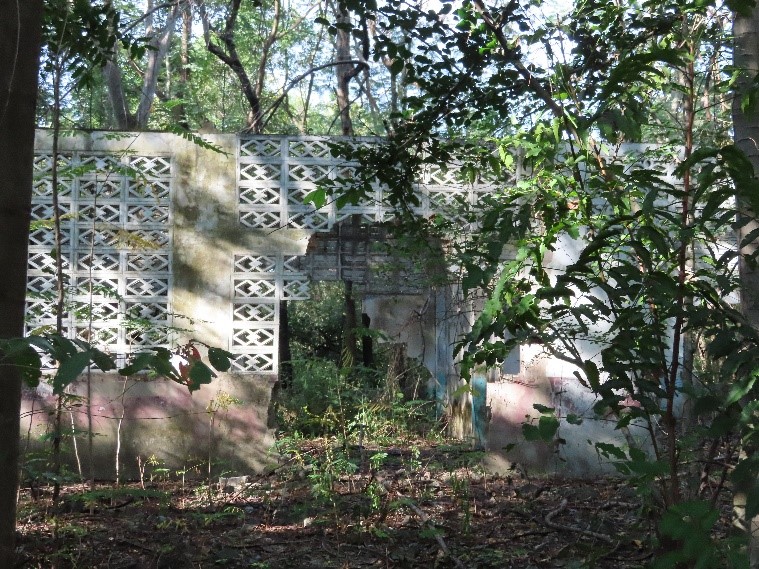
Violation of communities’ right to freedom of expression and assembly & Judicial Harassment to censor human rights defenders
Seeking solutions to their problems, the communities voiced their concerns and fought the injustice by filing complaints with government authorities, the National Human Rights Commission of Thailand and the Australian embassy. They also held peaceful protests; filed lawsuits against government officials, and shared their stories on social media. However, instead of receiving support, they were threatened, intimidated, judicially harassed, and even imprisoned. The community members who spoke out were targeted to discourage them from continuing their fight against the company, and deplete their financial resources. In particularly, the SLAPP (Strategic Litigation Against Public Participation) cases led to self-censorship of communities out of fear of being prosecuted.
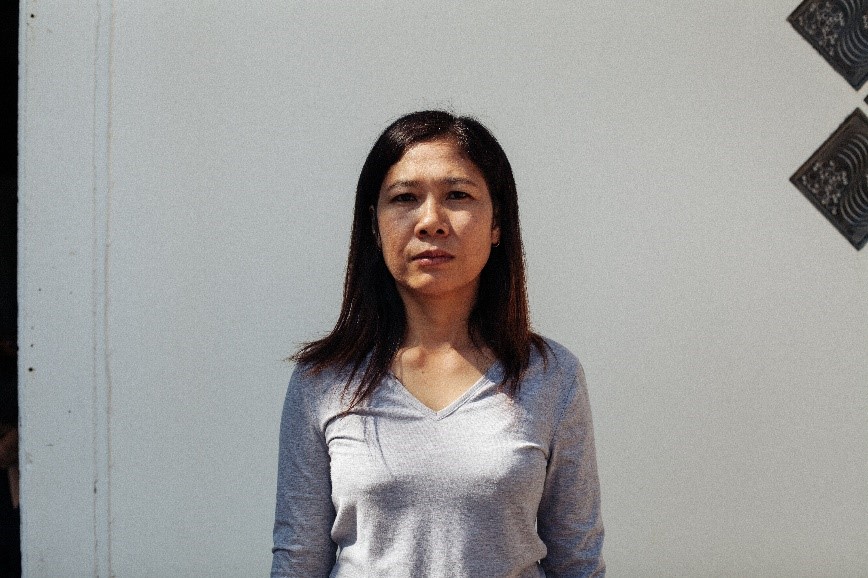
“I received a court warrant in 2016. It was clearly a charge to intimidate me. They chose to file charges against me, probably because I am the leader who opposed the mining operations, so they chose to create trouble for me. They intended to intimidate me, so that I would give up the fight”.
Why don’t the villagers move out?
Having lived in the area for generations, many villagers did not want to leave the place they call home. However, some villagers decided to leave as they were unable to continue farming or restore their livelihood. Yet many could not leave as the money they received for their land was insufficient to purchase land elsewhere. Those villagers continue to live in the area and suffer, with their situation worsening over the years.
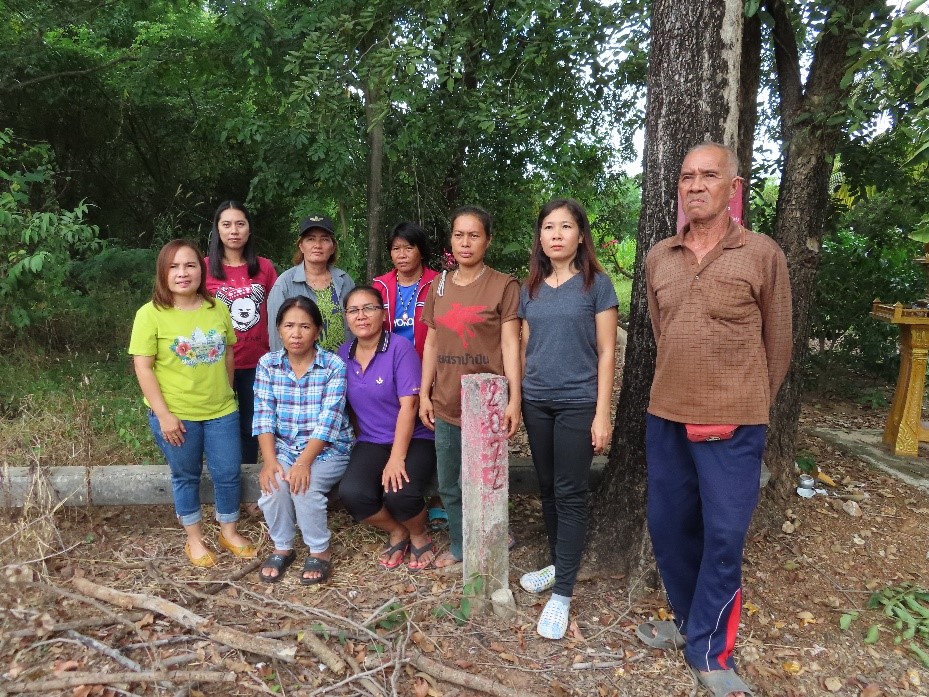
next to the house of community leader Ms. Premsinee
What has been done to help the villagers?
Despite the villagers facing intimidation and harassment, they have never given up their fight against Akara. Seeking justice, solutions, and effective remedy for the adverse impacts they experienced, the villagers have sent numerous complaints to the Thai government. While the government has responded to villagers’ complaints, they failed to hold Akara accountable and provide villagers with durable solutions to restore livelihoods and protect the environment.
Eventually, the government closed the mine from January 2017 but again this action was not accompanied with effective remedy, compensation or solutions for the villagers. Meanwhile, Akara refuses to acknowledge its responsibility for the harm caused, claiming that the company has always abided by Thai domestic legislation. The company is unwilling to provide compensation to the villagers or restore the environment.
What are the villagers’ demands?
To build solidarity, strengthen their voices, and fight against Akara’s corporate impunity, the villagers established the ‘Patient Network Affected by Goldmining, Phichit and Phetchabun Province’, which consists of more than 300 affected villagers. Seeking justice through the judicial system, in 2016, the villagers filed a class action lawsuit against Akara demanding financial compensation for (1) loss of livelihood; (2) health impacts, and (3) loss of natural resources and damage to the environment. The villagers demand individual financial compensation, as well as the establishment of an ‘Environmental Rehabilitation Fund’ to restore the environment. The class action lawsuit was finally accepted in October 2019 and is currently ongoing, with court hearings expected to start at the end of 2020.
“The villagers living around the mining site were directly affected so we filed a class-action lawsuit together to call upon the company to pay compensation and to restore the environment damaged by them, so that we can live a good life.” – Premsinee Sintontammatuch, community leader
To support the affected communities at the national level, Manushya Foundation:
- Enables the community to pursue their class-action lawsuit by providing financial assistance for costs incurred during the trial;
- Monitors court hearings;
- Provides capacity-building workshops and legal empowerment activities to the villagers;
- Delivers security training to community members, so they may stay safe both online and offline.
To support the affected communities at the international level, Manushya Foundation:
- Engages relevant UN Special procedures by making submissions of rights violations by Akara and Kingsgate in order to hold the companies responsible for the harm caused and to hold the Thai government accountable for their inaction in line with their obligations under international human rights law;
- Files a complaint before the OECD National Contact Point for Australia to highlight the violation of the OECD Guidelines for Multinational Enterprises by Kingsgate in order to hold them accountable for their failure to comply;
- Invites responses from Akara and Kingsgate concerning human rights violations against community members through the company response mechanism of the Business and Human Rights Resource Centre;

“At Manushya Foundation, we will not give up on communities who have been failed by a corrupted, flawed, and partial judicial system. We will fight back together with affected villagers until justice is served and perpetrators are hold into account.”
What happens next?
To hold Akara, Kingsgate, and the Thai government to account and to amplify the communities’ voices, the communities and Manushya will undertake advocacy activities at the national and international level:
November 2020:
Launch a campaign and petition to call upon the Ratchada Civil Court in Bangkok and the Thai government to respect the communities’ rights, rule in their favour in the class action lawsuit; guarantee their well-being, and protect them against future harm.
Join End Water Poverty’s global #ClaimYourWaterRights campaign to amplify the communities’ voices at international level in order to build support and solidarity to call for restoration of the communities’ life, livelihood and environment.
Submit complaints to UN Special Procedures on rights violations by Akara, Kingsgate, and the Thai government to hold them accountable for the harm caused and inaction in line with their obligations under international human rights law.
December 2020 – January 2021:
File a complaint before the OECD National Contact Point for Australia to highlight the violation of the OECD Guidelines for Multinational Enterprises by Kingsgate and to hold them accountable for their failure to comply.
The communities and Manushya Foundation will not give up the fight against Akara’s corporate impunity until justice for the affected villagers is served and perpetrators are held accountable.
How can you support the affected villagers?
Do you want to hear this powerful story from the community members themselves? Then watch this video!
The communities need your help in their struggle for a safe environment for themselves and future generations. To donate to the community, visit Manushya’s website!
This blog was written by Emilie Pradichit, Ananya Ramani, and Evie van Uden of Manushya Foundation. To learn more about Manushya Foundation’s work, please follow them on Facebook and Twitter.